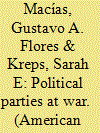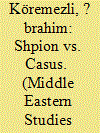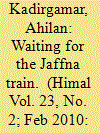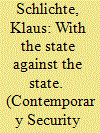| Srl | Item |
| 1 |
ID:
105346


|
|
|
| 2 |
ID:
127836


|
|
|
|
|
| Publication |
2013.
|
| Summary/Abstract |
What determines when states adopt war taxes to finance the cost of conflict? We address this question with a study of war taxes in the United States between 1789 and 2010. Using logit estimation of the determinants of war taxes, an analysis of roll-call votes on war tax legislation, and a historical case study of the Civil War, we provide evidence that partisan fiscal differences account for whether the United States finances its conflicts through war taxes or opts for alternatives such as borrowing or expanding the money supply. Because the fiscal policies implemented to raise the revenues for war have considerable and often enduring redistributive impacts, war finance-in particular, war taxation-becomes a high-stakes political opportunity to advance the fiscal interests of core constituencies. Insofar as the alternatives to taxation shroud the actual costs of war, the findings have important implications for democratic accountability and the conduct of conflict.
|
|
|
|
|
|
|
|
|
|
|
|
|
|
|
|
| 3 |
ID:
128218


|
|
|
|
|
| Publication |
2014.
|
| Summary/Abstract |
In October 1853, a war erupted between the Russian and the Ottoman empires, which became the celebrated Crimean War in the following year. The Danubian theatre, one of the crucial scenes of the war, witnessed both belligerents trying to discover the other's activities and planned operations. As they were inhabited by cosmopolitan and heterogeneous populations, Dobruca (Dobruja) and Bessarabia were the most convenient places for both parties to gather military intelligence. The Ottomans acquired information via the Wallachians and the Cossacks, as well as by diplomatic missions and various merchants. The Ottoman Empire's Orthodox Christian subjects - the Bulgarians and Greeks - assisted Russia in gathering information from the right bank of the Danube. Some of these reports were unreliable, as were the spies themselves. The Russian and Ottoman archives have rich resources related to military intelligence, which is an understudied aspect of the Crimean War. Relying upon the archival sources, this paper aims to discuss an entirely ignored topic: the espionage activities in the Balkan theatre during the Crimean War.
|
|
|
|
|
|
|
|
|
|
|
|
|
|
|
|
| 4 |
ID:
095765


|
|
|
| 5 |
ID:
090434


|
|
|
|
|
| Publication |
2009.
|
| Summary/Abstract |
In a world of growing security challenges, non-state armed actors have captured significant attention from scholars concerned with regime stability and the consolidation of national states. But the preoccupation with national political dynamics has eclipsed the study of non-state armed actors who struggle to secure economic dominion, and whose activities reveal alternative networks of power, authority, independence, and self-governance unfolding on a variety of territorial scales both smaller and larger than the nation-state. With a focus on actors as wide-ranging as private police, gangs, and mafias, this article charts the proliferation and significance of non-state armed action structured around economic activities, and assesses the nature of violence and insecurity generated by these activities in comparison to more conventional politically oriented non-state action. Drawing evidence primarily from middle-income countries of the global south, where political regimes are relatively more stable but a wide variety of non-state armed actors still proliferate, it examines the new 'spatiality' of non-armed state action directed toward economic sovereignty, argues that it forms the basis for alternative imagined communities of allegiance, and assesses the implications for the future of the traditional nation-state.
|
|
|
|
|
|
|
|
|
|
|
|
|
|
|
|